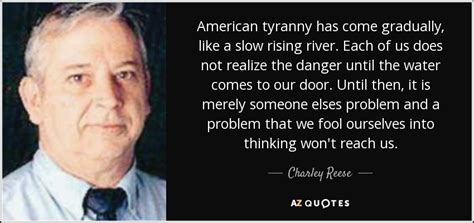A Quote by Charley Reese
[N]o American should retreat an inch on the right of jurors to acquit if they perceive the law or its administration to be unjust.
Related Quotes
In a democracy - even if it is a so-called democracy like our white-?litist one - the greatest veneration one can show the rule of law is to keep a watch on it, and to reserve the right to judge unjust laws and the subversion of the function of the law by the power of the state. That vigilance is the most important proof of respect for the law.
Since natural law was thought to be accessible to the ordinary man, the theory invited each juror to inquire for himself whether a particular rule of law was consonant with principles of higher law. This view is reflected in John Adams' statement that it would be an 'absurdity' for jurors to be required to accept the judge's view of the law, 'against their own opinion, judgment, and conscience.'


































